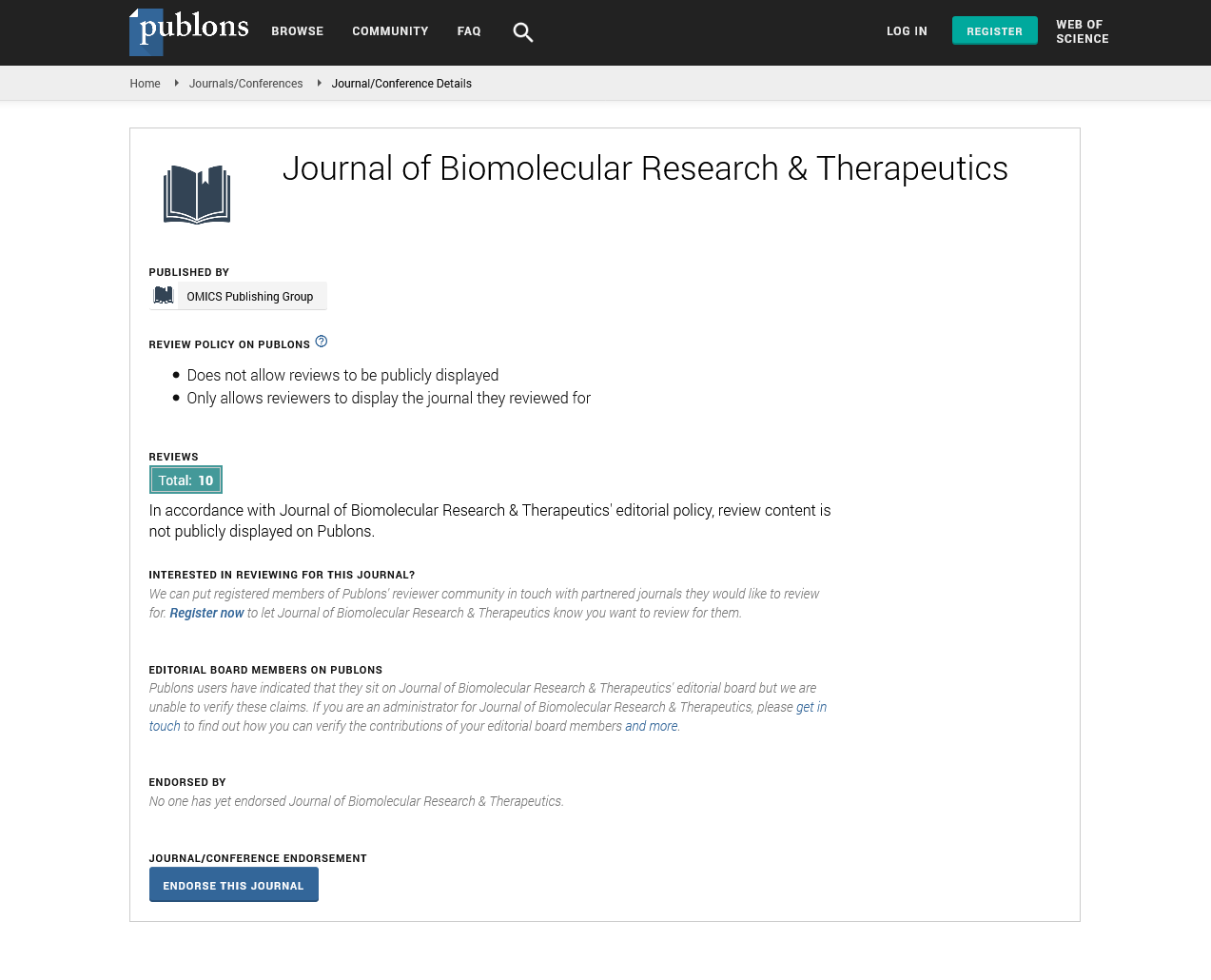Indexed In
- Open J Gate
- Genamics JournalSeek
- ResearchBible
- Electronic Journals Library
- RefSeek
- Hamdard University
- EBSCO A-Z
- OCLC- WorldCat
- SWB online catalog
- Virtual Library of Biology (vifabio)
- Publons
- Euro Pub
- Google Scholar
Useful Links
Share This Page
Journal Flyer

Open Access Journals
- Agri and Aquaculture
- Biochemistry
- Bioinformatics & Systems Biology
- Business & Management
- Chemistry
- Clinical Sciences
- Engineering
- Food & Nutrition
- General Science
- Genetics & Molecular Biology
- Immunology & Microbiology
- Medical Sciences
- Neuroscience & Psychology
- Nursing & Health Care
- Pharmaceutical Sciences
Perspective - (2023) Volume 12, Issue 3
Natural Killer Cell Cytolysis and Polyglutamine Protein in Tumor Cells
Clovia Naira*Received: 03-Mar-2023, Manuscript No. BOM-23-20282; Editor assigned: 06-Mar-2023, Pre QC No. BOM-23-20282(PQ); Reviewed: 22-Mar-2023, QC No. BOM-23-20282; Revised: 29-Mar-2023, Manuscript No. BOM-23-20282(R); Published: 05-Apr-2023, DOI: 10.35248/2167-7956.23.12.274
Description
Proteins are massive biomolecular and macromolecular structures that consist of one or more lengthy chains of amino acid residues. Proteins serve a wide range of roles within animals, including catalyzing metabolic events, DNA synthesis, responding to stimuli, provides support to cells and organisms and transporting chemicals. Proteins differ primarily in their amino acid sequence which is governed by the nucleotide sequence of their genes and usually results in protein folding into a certain 3D structure. Individuals with Huntington's disease have a lower tumor incidence which is mediated by unknown mechanisms. Additionally the effects of overexpression of polyglutamine protein on tumor detection by the host immune system.
Cell lines are cytotoxic intrinsic lymphocytes that recognize and kill cells with abnormal molecular patterns. It was revealed that polyQ nutrient increased the concentration of misfolded proteins in tumor cells and made them more to NK cell cytolysis. On the other side, polyQ peptide in Natural killer (NK) cells hampered cytolytic activity. NK lymphocytes are cytotoxic innate inflammatory responses that are part of the developing innate lymphoid cell family. NK cells are vital in tumor monitoring because they detect and eliminate altered cells by identifying aberrant molecular patterns on target cells. The function of NK cells in tumor monitoring is the lower tumor incidence in neurological illnesses was due to NK cells. On the other hand NK cells have been shown to have an apoptosis appearance in neurodegenerative illnesses. Disease-specific traits are determined by the particular protein for every disease and its biology. Although polyQ-altered proteins are widely distributed in various tissues, organs and their primary consequence is neuronal dysfunction defined by synapse loss, dendritic arborization atrophy, axon swelling and destruction of neuronal markers. Each repeat disorder affects a distinct part of the brain. Expansion illnesses is how the molecular interpretation repeats into polyQ tracts can contribute to neurodegeneration in various polyQ diseases. Several investigations have found consistent pathological underlying mechanisms in all polyQ expansion illnesses, abnormal protein misfolding causes abnormal interactions with critical binding partners, collagen synthesis the creation of nuclear and cytoplasmic inclusions, are the generation of hazardous fragments. Microglia, or resident macrophages in the brain, are essential in normal brain growth and development, CNS monitoring, and homeostasis maintenance in both healthy and diseased brains. They also play an important role in the neuroinflammation which has been linked to the aetiology of various neurodegenerative disorders including Alzheimer's. In the presence of autonomic microglia activation causes sterile inflammation. In Hyperactive Disorder (HD) mice models, therapeutic treatments that reduce neuronal inflammation delay disease progression. Most microglia research has traditionally used both cell lines from dead brain tissue or cultured foetal or adult Central Nervous System (CNS) tissue. There is a certain length of the CNS repeat required for disease in many polyglutamine (polyQ) disorders, and additional extension beyond this level is connected with age of starting and symptom severity. PolyQ enlargement in translated proteins promotes self-assembly into a range of oligomeric and fibrillar aggregation species that aggregate form the disease-associated protein inclusion bodies.
Citation: Naira C (2023) Natural Killer Cell Cytolysis and Polyglutamine Protein in Tumor Cells. J Biol Res Ther. 12:262.
Copyright: © 2023 Naira C. This is an open access article distributed under the terms of the Creative Commons Attribution License, which permits unrestricted use, distribution, and reproduction in any medium, provided the original author and source are credited.

